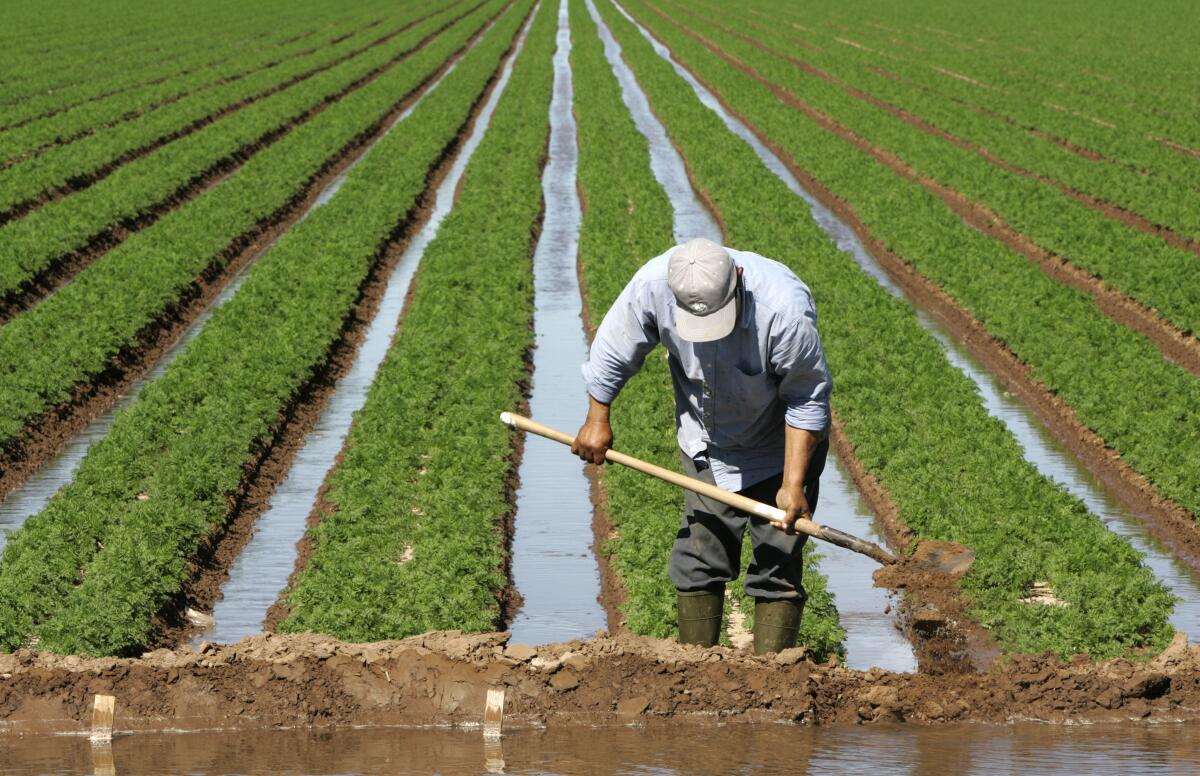Most California voters back coronavirus protections for undocumented farmworkers, poll finds

- Share via
A substantial majority of California voters support work protections for farmworkers — including undocumented immigrants — such as paid sick leave, medical benefits and replacement wages if they contract the coronavirus, a new statewide poll finds.
Some 80% of state voters support employers providing full replacement wages to farmworkers to stay home when sick with COVID-19, while 79% back equitable pay for such workers regardless of legal or guest worker status, according to a survey from the UC Berkeley Institute of Governmental Studies released Friday.
Just over seven in 10 believe that undocumented and legal workers should have equitable medical and paid sick leave should they catch the virus, with support heaviest among voters in Los Angeles County and the Bay Area. More than nine in 10 voters support providing hand-washing stations, personal protective equipment and work conditions that enable farmworkers to practice social distancing.
“We have come a long way since 1994 and Prop. 187,” said Victor Narro, project director for the UCLA Labor Center, who was not involved with the survey, referring to a 1994 California initiative to deny state services such as public education and healthcare to people in the country illegally. “I think this just highlights that.”
More than one-third of the country’s vegetables and two-thirds of its fruits and nuts are grown in California. Stay-at-home orders in California exempt farmworkers as essential employees. But many are undocumented, lack health insurance and don’t qualify for unemployment insurance or federal coronavirus relief, placing the state’s estimated farm workforce of 420,000 in a vulnerable position.
Views on workers’ rights vary by region, amount of trust in the federal government and overall attitudes toward immigrants, the poll found.
Support for medical and paid sick leave benefits for undocumented farmworkers was among lowest in the Central Valley and the Inland Empire. A quarter of Central Valley voters opposed the idea that employers should provide equitable medical and paid sick leave to all farmworkers, despite the integral role that the region’s agricultural industry plays in the state.
“The Central Valley area, you have a lot of cities and locations where there’s a conservative, anti-immigrant view,” Narro said. “I think that gets mingled into the issues of what farmworkers should be entitled to and what services they are entitled to in the midst of this crisis.”
The poll reveals the strong impact that partisanship, and views of President Trump, have on how people perceive the pandemic.
Some 56% of all respondents strongly agreed that, as designated essential workers, farmworkers should receive full replacement wages from their employers to stay home when sick with COVID-19. But just 30% of Republicans in the state support paying full wages to sick farmworkers, compared with 73% of Democrats.
“It’s a real partisan divide there,” said Dowell Myers, a demographer at USC. “Democrats see more of a cooperative organization to society and Republicans see it more as an individual struggle, and that if you have fallen down it is not because the system has conspired against you.”
Among voters who believe Trump is “completely responsible” for the pandemic and the shortage of tests and medical supplies, 71% strongly agree that undocumented farmworkers should receive the same medical and paid sick leave benefits as documented farmworkers if they fall sick with COVID-19, compared to 17% of voters who disagree that Trump is responsible.
The UC Berkeley poll was conducted by email in English and Spanish among 8,800 registered voters statewide, an unusually large sample that allows detailed analysis of subgroups. The results have an estimated margin of error of 3 percentage points in either direction.
Because the poll tallied only registered voters, it may not completely capture the full extent of views on rights that workers should have amid the outbreak. Although about 82% of eligible California adults are registered to vote, those who are not registered are, on average, younger and poorer.
“It leaves out a big part of the general immigrant population in areas like L.A. and the Central Valley,” Narro said. “This may explain the numbers in the Central Valley, where voters tend to have more conservative impressions regarding immigration.”
Voters’ views on immigration do indeed have an impact on their perspectives on farmworker protection, the poll found. Nearly 80% of voters who believe that immigrants make the United States a better place to live support the view that employers should provide PPE and allow for social distancing, compared to 54% of voters who think immigrants make the U.S. a worse place to live.
Undocumented farmworkers have been marginalized for decades, said Paul Ong, a UCLA professor and expert on the labor market status of minorities and immigrants, not only through depressed wages, but also by being denied the safety net of programs such as unemployment insurance.
Still, he said, the survey shows that most California voters understand that farmworkers are critical in times of crisis.
“They do hard work, they do a great service to society,” he said. “And at this time, they’re taking huge risk by continuing to work so that the food chain is not broken.”
More to Read
Sign up for Essential California
The most important California stories and recommendations in your inbox every morning.
You may occasionally receive promotional content from the Los Angeles Times.











